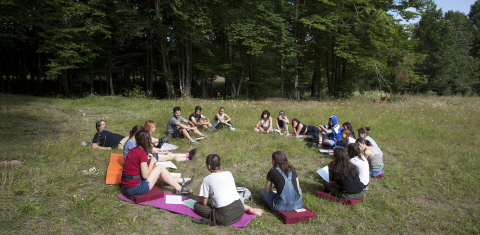SCHOOL YOURSELF
Dan Perjovschi, Monotremu
Curator: Cristian Nae
STATEMENT
The Școală-te (School Yourself) project proposes an exhibition designed both as a laboratory, a workshop open to the public and a political arena or the means of civic micro-intervention. The artistic installation, composed mostly of documentation of educational actions, processes or projects carried out in various social and cultural contexts (mainly in Romania), is the result of a collaboration between Dan Perjovschi and the artistic group Monotremu, artists from different generations but constantly concerned with artistic pedagogy. The dialogue that is established within this exhibition project does not aim to offer pre-established formulas, but rather to raise multiple questions, such as: what can art teach us and reciprocally, how can we learn art? What are the dangers that lurk when art, design and interior decorating tend to get confused? What real problems does the rigid Romanian education system still face, and how can we come up with formulas that allow us to develop creativity and critical thinking in particular? What do today’s art institutions fail to teach us? How do artists continue to learn constantly, long after completing their training in institutions dedicated to artistic pedagogy, and how do they go on to become trainers for the new generations?
In respect to the latter, Dan Perjovschi worked for a long time in the artistic context in Romania as an informal pedagogue, becoming by accumulating an indisputable artistic reputation a true man-institution, nomadic and always open to redistribute the accumulated image capital to support the new artistic generations, as well as vulnerable social categories. The exhibition organised together with Monotremu (as well as other young artists such as Cristian Răduță or the Anticamera group) is itself an example of the generosity of this intransigent artist, known for the sharpness of his critical remarks.
In this exhibition, instead of his well-known conceptualized drawings, Perjovschi prefers the format of the archive (another medium chosen by Dan Perjovschi as a long-term institutional project and made popular especially by Lia Perjovschi’s artistic projects such as CAA or Muzeul Cunoașterii (The Museum of Knowledge)). On the one hand, there are books and artist projects created mainly in the field of written culture: a collection of fanzines from 2000-2020, alternative publications made in collaboration with students from the Open School London and Head Geneva, a portable exhibition in the form of a newspaper dedicated to high schools in Romania, a collection of artist books from Romania in the 1990s, which illustrate alternative artistic pedagogy projects. In relation to the local context, Perjovschi opposes the anachronistic and rigid system of fine arts education at the University of Arts of Iași during the eighties when the artist was a student of this institution, based on the faithful but mechanical reproduction of reality, with a workshop carried out at Duke University where static nature is a simple pretext for a collaborative and participatory creative exercise.
In their turn, Monotremu prefer to use game as a pedagogical tool to deconstruct the authoritarian frameworks of “major” culture and to restore the naturalness of the artistic interaction meant to develop creativity. Often preferring to work in the format of the pedagogical workshop, which is also reactivated on the occasion of this exhibition, Monotremu use cultural icons as pretexts to generate critical discussions and contribute to the shaping of civic consciousness. However, the playful aspect does not divert from the capacity for social and critical analysis of these projects, which bring forth the obvious shortcomings of the Romanian education system and underline the worrying social situations in which present and future generations may find themselves. These include the social phenomenon of migration of young educated people to the West (known in the sociological literature as “brain migration”), the dissatisfaction generated by the constraints of the schooling system, and the effects of the lack of resources and the difficulty in accessing critical pedagogy in Romanian schools.
The dialogue between these critical positions and opened to the public clearly expresses the need to formulate in the public space the dissensions inherent in the Romanian education system, suffocated by the perpetuation of situations such as the unequal access to resources and successful educational models, the lack of meritocracy, provincialism and parochial attitude, conservatism and the perpetuation of authoritarian cultural and educational models. It is also an opportunity to deeply rethink both art and school and, more broadly, society.

